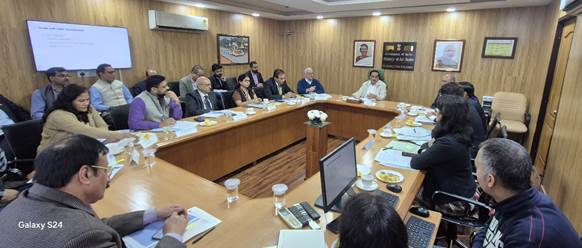New Delhi: Union Minister for Jal Shakti, C. R. Paatil, held a high-level meeting with representatives from nine key stakeholder ministries and departments to review the progress of the GOBARdhan Initiative. This ambitious program, aimed at converting organic waste into valuable resources like compressed biogas (CBG) and organic manure, underscores the government’s commitment to sustainability and a circular economy.
Paatil lauded Prime Minister Narendra Modi’s vision for the GOBARdhan initiative, emphasizing its transformative potential for waste management. He stated that the initiative reflects the government’s dedication to innovative solutions that support environmental sustainability and economic growth.
The Union Budget 2023-24 set a target of establishing 200 new CBG plants, marking a significant boost for the GOBARdhan initiative. Currently, 37 CBG plants are operational, with 133 in various stages of development. The sector has seen remarkable progress, growing from just 19 functional plants in 2020 to 125 operational plants today.
Representatives from the Ministry of Petroleum and Natural Gas highlighted steps to expedite the setup of 195 CBG plants, including finalizing guidelines for mandatory blending of CBG with CNG and PNG. A multi-party agreement involving financial institutions and oil and gas marketing companies is also nearing completion to streamline financing for CBG projects.
The Ministry of New and Renewable Energy shared updates on revised Waste-to-Energy scheme guidelines, which will include graded financial assistance to ensure the viability of these projects.
The Ministry of Housing and Urban Affairs announced plans to initiate construction of 67 additional CBG plants by March 2025, addressing challenges such as feedstock availability and site identification. It emphasized adopting a “Whole of Government” approach to resolve offtake and feedstock issues.
Paatil proposed conducting farmer education programs near CBG plants to raise awareness about the benefits of organic manure like Fermented Organic Manure (FOM) and Liquid Fermented Organic Manure (LFOM). Categorizing these products under the Fertilizer Control Order (FCO) was recognized as a critical step for improving soil health and encouraging their acceptance among farmers.
The Minister also highlighted the potential of the carbon credit system as a major revenue generator for the sector. He urged the government to establish mechanisms for incentivizing this emerging industry, aligning it with India’s net-zero goals.
Paatil praised the collective efforts of the stakeholder ministries and departments, expressing confidence in the GOBARdhan initiative’s potential to become a sunrise sector for the Indian economy. He assured participants that the government would continue to provide robust support to ensure the sector’s development and success.
“The GOBARdhan initiative is not just about waste management; it’s about creating a sustainable future and empowering rural communities through innovative solutions,” Paatil concluded.





